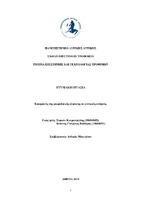| dc.contributor.advisor | Batrinou, Anthimia | |
| dc.contributor.author | Ξαϊδάρας, Ιωάννης Γεώργιος | |
| dc.contributor.author | Κουρουμλίδης, Συμεών | |
| dc.date.accessioned | 2023-10-23T10:34:25Z | |
| dc.date.available | 2023-10-23T10:34:25Z | |
| dc.date.issued | 2023-09-26 | |
| dc.identifier.uri | https://polynoe.lib.uniwa.gr/xmlui/handle/11400/5448 | |
| dc.identifier.uri | http://dx.doi.org/10.26265/polynoe-5285 | |
| dc.description.abstract | Αντικείμενο αυτής της εργασίας αποτελεί η μελέτη των φυτικών σπόρων, των ευεργετικών ιδιοτήτων που προσφέρουν οι μικροβιακές ζυμώσεις και των πιθανών εφαρμογών στη βιομηχανία τροφίμων. Οι φυτικές πηγές τροφίμων αποτελούν ένα αναπόσπαστο κομμάτι της ανθρώπινης διατροφής και εμφανίζουν προοπτικές ως προς την καταπολέμηση διάφορων σημαντικών ζητημάτων που σχετίζονται με την υγεία, το περιβάλλον, την οικονομία και την κοινωνία.
Η αύξηση του παγκόσμιου πληθυσμού σε συνδυασμό με την αυξανόμενη ζήτηση για τροφή, άρα και πρωτεΐνη, καθιστά την εκτενή κτηνοτροφία και αλιεία μη βιώσιμη. Από την άλλη, οι φυτικές πρωτεΐνες αποτελούν μια βιώσιμη εναλλακτική που είναι ικανή να αποσυμφορήσει τον πλανήτη και, σε συνδυασμό με τη δράση των ζυμώσεων, μετατρέπονται σε πηγές πλήρους τροφοδότησης αμινοξέων. Μέσω ελεγχόμενων μικροβιακών ζυμώσεων οι φυτικοί σπόροι εκδηλώνουν νέες ιδιότητες που συντελούν στην ποιότητα και την ασφάλεια των τροφίμων καθώς και την παραγωγή νέων προϊόντων. Επίσης, καταστέλλουν τη δράση των αντιδιατροφικών παραγόντων, όπως το φυτικό οξύ, βελτιώνοντας τα χαρακτηριστικά του τροφίμου.
Στη συγκεκριμένη εργασία χρησιμοποιήθηκαν σπόροι από λοβούς καρπών της χαρουπιάς (Ceratonia siliqua L.), ενός φυτού που υπάρχει σε πλεόνασμα στα μεσογειακά κράτη και εμφανίζει πληθώρα εφαρμογών. Το πειραματικό κομμάτι χωρίστηκε στα εξής δύο μέρη: α)στη μελέτη της πεπτικότητας του χαρουπιού με τη χρήση μικροοργανισμών (καλλιέργειες οξυγαλακτικών και ζυμών) και των κατάλληλων ενζύμων μέσω της μέτρησης pH, και β) στην εξέταση της ποσότητας του φυτικού οξέος μέσω μετρήσεων του ελεύθερου και ολικού φωσφόρου στα δείγματα έπειτα από μικροβιακή ζύμωση (με οξυγαλακτικά βακτήρια, ζύμες, A. oryzae). | el |
| dc.format.extent | 119 | el |
| dc.language.iso | el | el |
| dc.publisher | Πανεπιστήμιο Δυτικής Αττικής | el |
| dc.rights | Αναφορά Δημιουργού - Μη Εμπορική Χρήση - Παρόμοια Διανομή 4.0 Διεθνές | * |
| dc.rights | Attribution-NoDerivatives 4.0 Διεθνές | * |
| dc.rights | Attribution-NoDerivatives 4.0 Διεθνές | * |
| dc.rights.uri | http://creativecommons.org/licenses/by-nd/4.0/ | * |
| dc.subject | Μικροβιακή ζύμωση | el |
| dc.subject | Φυτικοί σπόροι | el |
| dc.subject | Πρωτεΐνες | el |
| dc.subject | Χαρούπι | el |
| dc.subject | Πεπτικότητα πρωτεϊνών | el |
| dc.subject | Φυτικό οξύ | el |
| dc.title | Εφαρμογές της μικροβιακής ζύμωσης σε φυτικούς σπόρους | el |
| dc.title.alternative | Applications of microbial fermentation on plant seeds | el |
| dc.type | Πτυχιακή εργασία | el |
| dc.contributor.committee | Στρατή, Ειρήνη | |
| dc.contributor.committee | Κοντελές, Σπυρίδων | |
| dc.contributor.faculty | Σχολή Επιστημών Τροφίμων | el |
| dc.contributor.department | Τμήμα Επιστήμης και Τεχνολογίας Τροφίμων | el |
| dc.description.abstracttranslated | The following dissertation concerns the study of plant seeds and the beneficial properties of their microbial fermentation that will lead to potential applications in the food industry. Plant based foods occupy an essential part of human nutrition and their use can confront serious issues concerning healthcare, the environment, the economy and overall, the society.
Due to the increase of the global population and the subsequent increasing demand for food, therefore for protein, intensive animal farming and fishery have become unsustainable. Conversely, a sustainable alternative that is capable of relieving the planet is plant-based proteins. The aforementioned, coupled with the effects of fermentation are converted to complete sources of amino acids. Through controlled microbial fermentations, the plant seeds acquire new beneficiary properties that contribute to the quality and safety of the foods and potentially provide new products. Furthermore, the fermentations limit the anti-nutritional factors, such as the phytic acid, enhancing the profile of the food.
In this paper, the item of examination is the seeds from pods of carob (Ceratonia siliqua L.), a plant that exists in abundance in the Mediterranean countries and showcases a wide range of uses. The experimental part was divided into the following two parts: a) the study of carob digestibility using microorganisms (lactic acid cultures and yeasts) and the appropriate enzymes through pH measurement, and b) the examination of the amount of phytic acid through measurements of free and total phosphorus in the samples after microbial fermentation (with lactic acid bacteria, yeasts, A. oryzae). | el |



